<strong>The</strong> Sustainability of a Physical Activity and Nutrition Program for SeniorsPresented by: Maria Pasalich, School of Public <strong>Health</strong>Course: Bachelor of <strong>Science</strong> (<strong>Health</strong> <strong>Science</strong>) (Honours)Supervisors: Dr. Jonine Jancey, Prof. Andy Lee, Linda BurkeOlder adults, a growing segment of the population are at an increased risk of developing chronichealth problems, and this is not simply due to the physiological changes associated with ageing.This age group is becoming increasingly inactive and a large proportion of them are not meetingthe recommended daily intake for fruit and vegetables. Both of these factors have contributed tothe high levels of overweight and obesity, a major public health issue in Australia. Regular physicalactivity and a nutritionally balanced diet lead to a range of health benefits, and play a preventativerole for several chronic health conditions such as type 2 diabetes and cardiovascular disease. It istherefore vital that efforts be made to improve the physical activity and dietary behaviours of theolder population through healthy lifestyle promotion.<strong>The</strong> PANS (Physical Activity and Nutrition for Seniors) program was developed for insufficientlyactive, younger seniors groups (aged 60 to 70 years) living in low to medium socioeconomicsuburbs. This 12-month randomised controlled trial involved a 6-month home-based, semi-tailoredphysical activity and nutrition intervention, which incorporated goal setting and social support.<strong>The</strong> current focus of this research is to assess the long-term impact of the PANS program inrelation to self-reported physical activity, dietary behaviours and anthropometric measures, at 6-months post-program. Evaluation at this time point is important as there is insufficient evidenceregarding the sustainability of health promotion interventions for older adults. This follow-upresearch will provide valuable insight into the effectiveness of interventions after a no-contactperiod, an area of program sustainability which has been largely ignored.Family Functioning in Families with a Child with Down Syndrome: A MixedMethods ApproachPresented by: Kate Povee, School of Psychology and Speech PathologyCourse: Bachelor of Psychology (Honours)Supervisors: Dr. Lynne Roberts, Dr. Helen LeonardThis study aimed to explore the factors that predict functioning in families with a child with Downsyndrome using a combination of quantitative and qualitative research methodologies. <strong>The</strong>quantitative component examined the effect of maladaptive and autism-spectrum behaviours onthe functioning of the family whilst the qualitative component explored the impact of having a childwith Down syndrome on family holidays, family activities and general family functioning.Participants in this study were 256 primary care givers of children with Down syndrome aged 4-25years (57.47% male; 42.53% female) currently residing in Western Australia (75.10% inmetropolitan Perth and 24.90% in rural Western Australia).In 2004, primary care givers completed the multi-dimensional, self-report Down syndrome NOWquestionnaire. <strong>The</strong> scales used in this study assessed family functioning, marital adjustment,maladaptive behaviour, autism-spectrum behaviour and functional ability. Maladaptive and autismspectrumbehaviour accounted for a significant 5.64% of the variance in family functioning. Meantotal scores on the measures of family functioning and marital adjustment were comparable to thatof families of typically developing children.Consistent with the quantitative findings, normality was the most common theme to emerge in thequalitative data. Child problem behaviours were also identified by parents/carers as having anegative impact of the family. This study has implications for the development of programs tosupport families with a child with Down syndrome and may dispel some of the myths surroundingthe impact of intellectual disability on the family.
Optimizing Vitrification of Human Oocytes for In-vitro Fertilization (IVF)ApplicationPresented by: Vicky Y. K. Seet, School of Biomedical <strong>Science</strong>sCourse: Bachelor of <strong>Science</strong> (Molecular Genetics and Biotechnology) (Honours)Supervisors: Dr. Ghanim Almahbobi, Dr. James StangerOocyte cryopreservation is a powerful clinical practice currently used in IVF clinics, allowing fertilitypreservation in women for several reasons. Vitrification of oocytes involves ultrarapid cooling usinghigh concentrations of cryoprotectants to minimise injuries of oocytes due to ice formation.However, usage of high concentrations of cryoprotectants can have detrimental toxic effects on thequality of the oocyte and eventually the health of the offspring. Also, the assessment of oocytequality has commonly been performed based only on the morphological appearance of oocytes.Using both morphological and functional parameters, this project determines whether acombination of multiple cryoprotectants at lower concentrations will have less toxicity and result inbetter cryosurvival than the use of single cryoprotectant at a higher concentration. Surplus oocytesfrom patients attending Pivet IVF clinic were collected and vitrified based on the Cryotop method,using three different cryoprotectants either individually or in combination. <strong>The</strong> morphological andfunctional integrity of the vitrified oocytes were investigated using light microscopy and computerbasedquantitative immunofluorescence of mitochondria, DNA and microtubules, respectively.<strong>The</strong> results show that the rate of morphological and functional integrity in oocytes vitrified with acombination of cryoprotectants was significantly higher than in oocytes vitrified with singlecryoprotectant. However, the quality of vitrified oocytes significantly varied depending on thespecific cryoprotectant and the type of combination. <strong>The</strong> results of this study has not only allowedus to determine that a combination of cryoprotectants will have the least detrimental effects onvitrified oocytes, but also provide evidence that observations based purely on oocyte morphologicalassessment is insufficient and sometimes misleading. This outcome will have a significantimplication in the area of oocyte cryopreservation as an important approach of assistedreproductive technology for the purpose of fertility preservation.Antenatal Physical Activity and NutritionPresented by: Jenna Smedley, School of Public <strong>Health</strong>Course: Bachelor of <strong>Science</strong> (<strong>Health</strong> Promotion) (Honours)Supervisors: Dr. Jonine Jancey, Prof. Peter Howat, Ginny MontieroPurpose: Explore women’s behaviours in regard to physical activity and nutrition and identify whatchanges take place when they enter pregnancy; Assess the knowledge they have concerning thebenefits of physical activity and healthy eating during pregnancy and conversely the consequencesof inactivity and an unhealthy diet; Identify their attitude toward physical activity and healthy eatingand its relationship to weight management.Method: This exploratory research project was completed over an 8-month period. <strong>The</strong> studypopulation included women over the age of 18; pregnant within the last 12-months; and with nopre-existing illness. Most participants were recruited through mothers groups located in the Perthmetropolitan area and Geraldton in the Mid-west. Qualitative data was collected via one-on-oneinterviews. This helped inform the development of the quantitative self-complete surveys. Datawas collected on participants physical activity behaviour; frequency of food consumption based onfat, fibre and sugar before and during pregnancy; sources of health behaviour information; and thepreferred format, delivery, time and frequency of a health promotion interventions duringpregnancy. Finally demographic data were collected.Preliminary Results: In total, nineteen interviews were completed, and the response rate for theself-complete survey was 68% (n=95), with participants being drawn from high, medium and lowSES as determined by SEIFA scores. <strong>The</strong> sample population was comprised of women aged 19-40 years (mean age=30), 70.4% (n=64), were born in Australia, 65.9% (54) had a healthy weightaccording to the Body Mass Index (BMI 18 - 25).Women reported eating 5 serves of vegetable a day in a usual week more frequently whilepregnant and decreased their frequency of fast food consumption. Women who reported beingmore active prior to pregnancy (47%, n=44) were 1.75 (OR 47.7/27.2) times more likely to havehad a healthier diet before falling pregnant, 25% (n=11) of women reported being unsure if theirdiet was more or less healthy.Conclusion: Pregnancy represents an opportune time to influence the uptake of positive lifestylebehaviours among women. This information will be useful as it will help inform the development ofeducation for women during pregnancy.


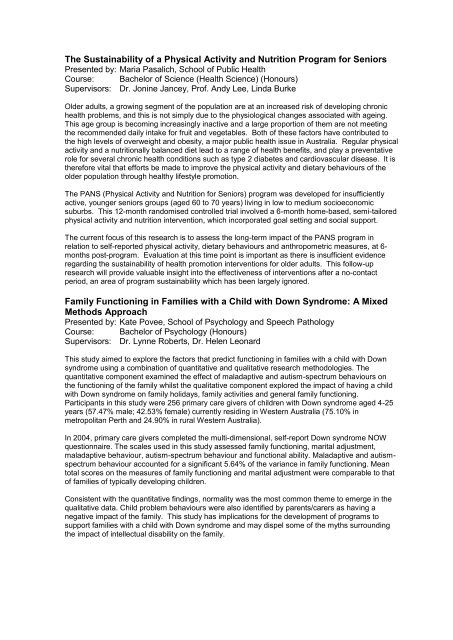
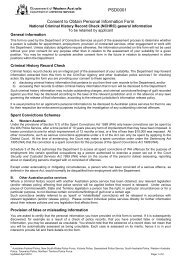
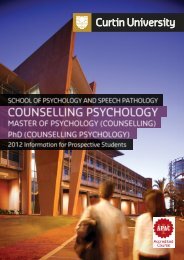
![Mental health commission report July 2010 - June 2011 [.pdf]](https://img.yumpu.com/50755705/1/184x260/mental-health-commission-report-july-2010-june-2011-pdf.jpg?quality=85)
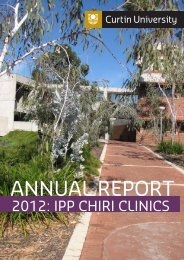
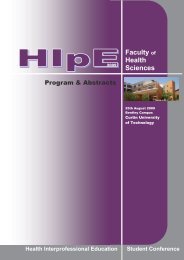
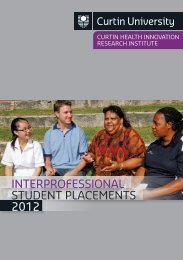
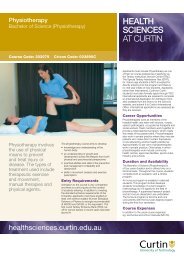



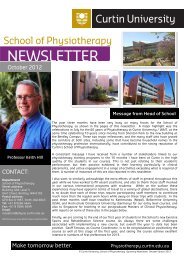


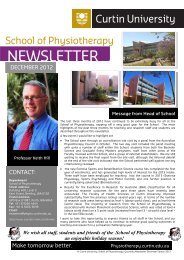
![2007 Annual Report [.pdf] - Health Sciences - Curtin University](https://img.yumpu.com/44476724/1/184x260/2007-annual-report-pdf-health-sciences-curtin-university.jpg?quality=85)